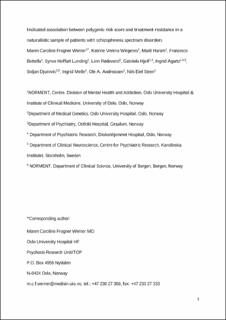| dc.contributor.author | Werner, Maren Caroline Frogner | |
| dc.contributor.author | Wirgenes, Katrine Verena | |
| dc.contributor.author | Haram, Marit | |
| dc.contributor.author | Bettella, Francesco | |
| dc.contributor.author | Lunding, Synve Hoffart | |
| dc.contributor.author | Rødevand, Linn Nilsen | |
| dc.contributor.author | Hjell, Gabriela | |
| dc.contributor.author | Agartz, Ingrid | |
| dc.contributor.author | Djurovic, Srdjan | |
| dc.contributor.author | Melle, Ingrid | |
| dc.contributor.author | Andreassen, Ole Andreas | |
| dc.contributor.author | Steen, Nils Eiel | |
| dc.date.accessioned | 2021-04-30T11:48:15Z | |
| dc.date.available | 2021-04-30T11:48:15Z | |
| dc.date.created | 2020-07-31T12:59:03Z | |
| dc.date.issued | 2020 | |
| dc.Published | Schizophrenia Research. 2020, 218 55-62. | |
| dc.identifier.issn | 0920-9964 | |
| dc.identifier.uri | https://hdl.handle.net/11250/2740598 | |
| dc.description.abstract | Background
One third of people diagnosed with schizophrenia fail to respond adequately to antipsychotic medication, resulting in persisting disabling symptoms, higher rates of hospitalization and higher costs for society. In an effort to better understand the mechanisms behind resistance to antipsychotic treatment in schizophrenia, we investigated its potential relationship to the genetic architecture of the disorder.
Methods
Patients diagnosed with a schizophrenia spectrum disorder (N = 321) were classified as either being treatment-resistant (N = 108) or non-treatment-resistant (N = 213) to antipsychotic medication using defined consensus criteria. A schizophrenia polygenic risk score based on genome-wide association studies (GWAS) was calculated for each patient and binary logistic regression was performed to investigate the association between polygenetic risk and treatment resistance. We adjusted for principal components, batch number, age and sex. Additional analyses were performed to investigate associations with demographic and clinical variables.
Results
High levels of polygenic risk score for schizophrenia significantly predicted treatment resistance (p = 0.003). The positive predictive value of the model was 61.5% and the negative predictive value was 71.7%. The association was significant for one (p = 0.01) out of five tested SNP significance thresholds. Season of birth was able to predict treatment-resistance in the regression model (p = 0.05).
Conclusions
The study indicates that treatment-resistance to antipsychotic medication is associated with higher polygenetic risk of schizophrenia, suggesting a link between antipsychotics mechanism of action and the genetic underpinnings of the disorder. | en_US |
| dc.language.iso | eng | en_US |
| dc.publisher | Elsevier | en_US |
| dc.rights | Attribution-NonCommercial-NoDerivatives 4.0 Internasjonal | * |
| dc.rights.uri | http://creativecommons.org/licenses/by-nc-nd/4.0/deed.no | * |
| dc.title | Indicated association between polygenic risk score and treatment-resistance in a naturalistic sample of patients with schizophrenia spectrum disorders | en_US |
| dc.type | Journal article | en_US |
| dc.type | Peer reviewed | en_US |
| dc.description.version | acceptedVersion | en_US |
| dc.rights.holder | Copyright 2020 Elsevier | en_US |
| cristin.ispublished | true | |
| cristin.fulltext | postprint | |
| cristin.qualitycode | 2 | |
| dc.identifier.doi | 10.1016/j.schres.2020.03.006 | |
| dc.identifier.cristin | 1821140 | |
| dc.source.journal | Schizophrenia Research | en_US |
| dc.source.40 | 218 | |
| dc.source.pagenumber | 55-62 | en_US |
| dc.identifier.citation | Schizophrenia Research. 2020, 218, 55-62 | en_US |
| dc.source.volume | 218 | en_US |

